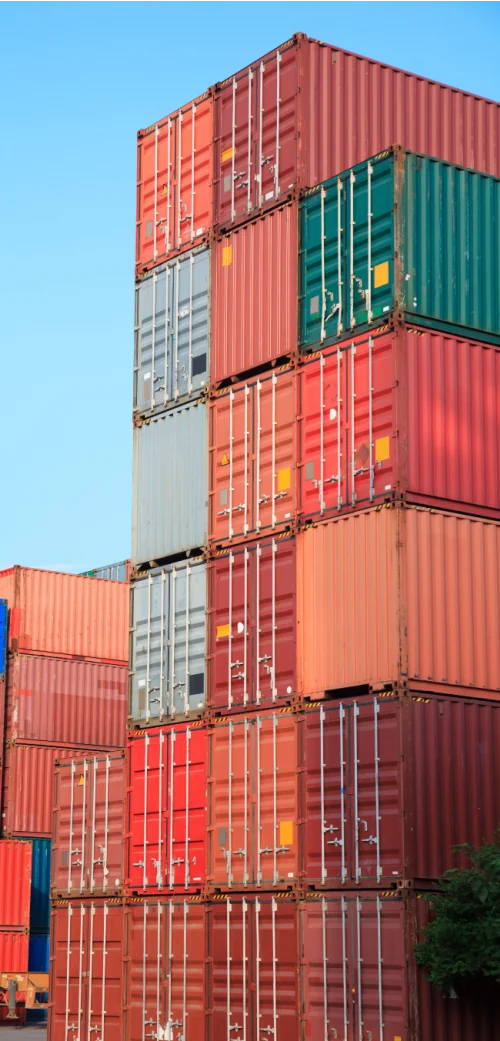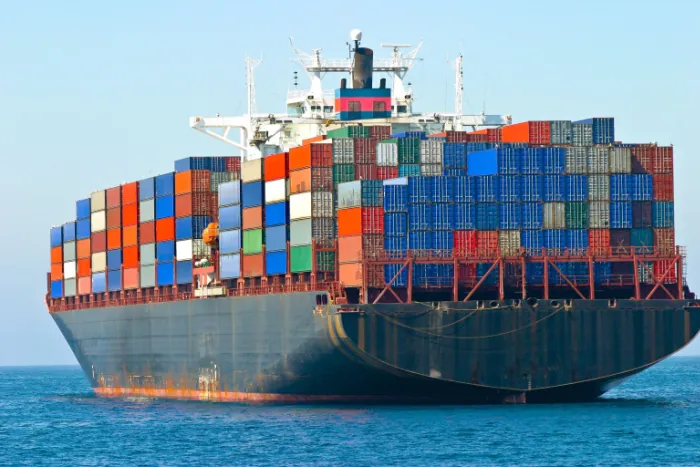
Intermodal Shipping
Unlock boundless possibilities with our Intermodal Shipping! Seamlessly combining rail, road, and sea, we deliver your cargo with unmatched efficiency and speed. Explore our dynamic shipping solutions and revolutionize your logistics journey today!
What Is Intermodal Rail Freight?
Intermodal rail freight is a smart, cost-effective shipping method that combines the long-haul efficiency of rail with the precision and flexibility of truck transport. With this hybrid approach, your freight travels by train to a regional rail hub, where it’s transferred to a truck for final delivery—giving you the best of both worlds.
At FreightCenter, we specialize in coordinating seamless intermodal shipping solutions for businesses across the U.S. Whether you’re moving freight coast to coast or between regional hubs, our platform makes it easy to compare carriers, rates, and routes—all in one place.
Thousands of businesses trust FreightCenter to move their freight faster, smarter, and cheaper! From unbeatable rates to top-notch service, our customers are raving about their shipping success.
See why they keep coming back!
Award-Winning Service, Trusted by Shippers Everywhere!
- 2021, 2017 & 2016 Food Logistics’ Top Green Providers
- 2021 & 2018 Supply & Demand Chain Executives’ Pros to Know: Matthew Brosious
- 2020 & 2019 Top Food Logistics’ 3PL & Cold Storage Provider Award
- 2020 & 2019 Business Observer’s Top 500 Companies on the Gulf Coast
- 2020 & 2017 SmartWay® Transport Partner
- 2020 & 2017 Food Logistics’ Champions: Rock Stars of the Supply Chain
- 2020 Best of Palm Harbor Awards for Local Businesses
- 2017 Green Supply Chain Award from Supply & Demand Chain Executive
- 2017 Tampa Bay Business Journal Heroes at Work
- 2016, 2015, & 2012 Food Logistics Top 100 Software and Technology Providers
- 2013 Tampa Bay Business 100 by Tampa Bay Business Journal
- 2013 Top 100 Great Supply Chain Partners by SupplyChainBrain
- 2012 TIA Samaritan Award Honorable Mention
- 2012, 2011 & 2010 TBBJ Fast 50 Recipient
- 2013, 2011, & 2010 Diversity Business Top Businesses

Why Choose FreightCenter For Intermodal Freight Services?
Are you looking for a reliable and cost-effective way to transport your freight over long distances? Look no further than FreightCenter’s intermodal freight services!
We understand that shipping your freight can be stressful and time-consuming, so we offer a range of intermodal freight services to meet your unique shipping needs. Whether you need to transport hazardous materials, oversized items, or just a large freight volume, we have the experience and expertise to do the job.
So why choose FreightCenter for your intermodal freight services? Here are just a few reasons:
- Extensive Network: Our network includes a wide range of carriers that specialize in intermodal freight services. This allows us to offer competitive rates and various shipping options to meet your needs.
- Expertise: Our team of experienced shipping experts has the knowledge and expertise to handle even the most complex intermodal freight shipments. We can help you navigate the shipping process from start to finish, ensuring that your freight arrives at its destination safely and on time.
- Technology: We use the latest technology to provide real-time tracking and updates on your shipment, so you always know where your freight is and when it will arrive.
- Customer Service: Our dedicated customer service team is available to answer any questions or concerns you may have about your intermodal freight shipment. We are committed to providing excellent customer service and ensuring your satisfaction with every shipment.
At FreightCenter, we are committed to providing our customers with reliable, cost-effective, and efficient intermodal freight services. Contact us today to learn how we can help you with your next shipment! Call Us 800-716-7608
What are the Benefits of Intermodal Freight Shipping?
At FreightCenter, we connect shippers to a smarter, more flexible way to move freight: intermodal shipping. By combining the long-haul efficiency of rail with the flexibility of trucking, intermodal shipping delivers real cost savings, reliability, and scalability—especially when truck capacity is tight or fuel costs are high.
Here’s why more businesses are choosing FreightCenter’s intermodal solutions:
Big Savings on Long-Distance Routes
When your shipment is traveling over 1,000+ miles, intermodal can significantly cut transportation costs. Rail consumes up to 40% less fuel than over-the-road trucking, which leads to substantial savings—especially on long hauls.
Relief from Driver Shortages & Tight Capacity
With rising demand and limited drivers, truckload availability can be unpredictable. Intermodal shipping helps bypass this issue by relying on scheduled rail service for the long haul, with drayage trucks handling the first and final miles—offering greater reliability and capacity when you need it most.
Higher Load Efficiency with Double-Stacked Containers
Freight trains often carry double-stacked containers, increasing cargo volume without needing more space or fuel. This not only improves efficiency, it helps protect your freight during transit by reducing handling and stacking issues.
Optimized Route Planning with FreightCenter Experts
Our experienced freight brokers use advanced logistics tools to map the most efficient intermodal routes based on your timeline, cargo type, and budget. We work with trusted rail carriers like Union Pacific, BNSF, CSX, and Norfolk Southern to make sure your shipment moves smoothly.
Reduced Handling = Less Risk of Damage
With intermodal, your freight stays in the same container from origin to destination—reducing touchpoints and the risk of damage. That’s peace of mind you can count on.
At FreightCenter, we’ve been helping businesses unlock the power of intermodal shipping for over 25 years. Our platform lets you compare rates, transit times, and carriers in real-time—so you can make smarter shipping decisions faster.
Are you curious if intermodal is right for your freight?
Call 800.716.7608 or
👉 Get a Free Intermodal Quote
What Are the Benefits of Intermodal Freight for Your Business?
- Cost Savings: Rail freight is a cost-effective option for shipping large and heavy loads. Trains move more cargo in one trip than a truck, reducing transportation costs.
- Reduced Carbon Footprint: By using rail freight, your business can reduce its carbon footprint and demonstrate a commitment to sustainability.
- Improved Reliability: Rail freight is often more reliable than other modes of transportation, such as trucks. Trains operate on a set schedule.
- Increased Security: Rail freight can be more secure than other modes of transportation, such as trucks. Trains are less susceptible to theft and accidents on the road.
- Improved Supply Chain Efficiency: By using rail freight as part of an intermodal supply chain, your business can improve overall supply chain efficiency.Inter
Rail freight is a greener and more sustainable option for shipping large and heavy loads. It produces fewer emissions per ton-mile than other modes of transportation, reduces congestion, and is more energy-efficient. By using rail freight, your business can reduce transportation costs.

Intermodal vs. Rail Freight
Intermodal freight and rail freight are both transportation options for moving goods from one location to another, but there are some critical differences between the two.
Rail freight refers to the movement of goods by rail. This typically involves shipping cargo on a train, which can be owned and operated by a railroad company or a third-party logistics provider. Rail freight is generally used for sending large and heavy goods, such as coal, grain, and automobiles, over long distances. The cargo is usually loaded onto specialized railcars designed to transport the specific type of cargo.
Intermodal freight is typically used for shipping smaller and lighter goods over shorter distances, such as consumer goods, electronics, and pharmaceuticals. On the other hand, intermodal freight involves multiple modes of transportation to move goods from one location to another. This may include shipping cargo by rail, truck, ship, or a combination of these modes.
One of the main benefits of intermodal freight is its flexibility. Since it can involve multiple modes of transportation, it can be customized to meet the specific needs of a shipment. For example, cargo may be transported by rail to a particular location, then loaded onto a truck for delivery to its final destination. This allows for greater customization and control over the shipment and can help to reduce shipping costs and transit times.
Another critical difference between rail freight and intermodal freight is the level of complexity involved. Rail freight typically affects only one transportation mode, making it a more straightforward process. Intermodal freight, on the other hand, requires coordination between multiple parties and modes of transportation, making it more complex and challenging to manage.
Overall, rail and intermodal freight offer unique benefits and are suitable for different types of shipments. Businesses should carefully consider their shipping needs and requirements when choosing between them. Factors such as the size and weight of the shipment, the distance to be traveled, and the desired transit time should all be considered when making a decision.
Is Shipping by Rail Cheaper?
The short answer is yes! When you use a trucking carrier, you pay the fuel, fees, tolls, labor, and other associated costs. When you use intermodal services, hundreds of containers are moved simultaneously. That lowers the cost per load.
Regarding shipping large volumes of freight over long distances, rail transportation can offer significant cost savings compared to traditional trucking methods. Rail transportation is more fuel-efficient than trucking, which means it can simultaneously move larger volumes of freight, resulting in lower transportation costs per cargo unit.
Additionally, rail transportation is often more reliable and has a lower accident rate than trucking, which can further reduce the risk and cost of transportation. Rail shipping can also help minimize highway traffic congestion and carbon emissions, making it a more sustainable transportation option.
However, it’s important to note that the cost of shipping by rail depends on several factors, including the distance, the type of freight being shipped, and the route taken. In some cases, trucking may be a more cost-effective option, especially for short distances or certain types of freight requiring more specialized handling or transportation.
Furthermore, rail shipping may involve additional fees and surcharges, such as accessorial charges for pickup and delivery, fuel surcharges, and equipment charges. These charges can add up quickly and affect the overall shipping cost by rail, so it’s important to factor them into your shipping decision.
When considering shipping by rail, it’s essential to compare the costs and benefits of different transportation options and work with a trusted freight broker or carrier to help you navigate the shipping process and find the most cost-effective solution.
Benefits of Using Intermodal Rail Freight
Intermodal rail freight is a type of transportation that uses a combination of rail and other modes of transport, such as trucks and ships, to move goods from one place to another. This mode of transportation offers several benefits beyond just cost savings, which are:
Environmentally Friendly: Intermodal rail freight produces fewer emissions per ton-mile than trucking, making it a more sustainable option. Rail transportation uses less fuel per ton-mile than road transportation, significantly reducing greenhouse gas emissions. In addition, trains can transport more freight in one trip than a truck, reducing the number of vehicles on the road and reducing emissions.
Increased Security:
Rail freight can be more secure than trucking. Trains are less susceptible to theft and accidents on the road, making them a safer option for shipping high-value or sensitive cargo. Additionally, the containers used in intermodal rail transport are often more secure and durable, which protects the load from damage and theft.
Reduced Congestion:
Rail freight can help reduce traffic congestion on highways and wear and tear on roads, benefiting the overall transportation system. Using rail freight can also free up highway space for other vehicles, reducing the number of accidents and improving overall road safety.
Increased Capacity:
Rail freight has the potential to move a larger volume of cargo at once than trucks. This can be especially advantageous for companies with large quantities of freight to transport. Trains can transport more cargo in one trip than a truck, reducing the number of trips needed to move the shipment and ultimately reducing transportation costs.
Reliability:
Rail freight is often more reliable than trucking. Trains operate on a set schedule, which reduces the likelihood of delays caused by traffic or weather-related issues. This makes rail freight an attractive option for companies transporting goods on a specific timeline.
Flexibility:
Intermodal rail freight allows for flexibility in transportation planning. This flexibility will enable companies to customize their shipping plans to meet specific needs and requirements. It can be combined with other modes of transportation, such as trucks and ships, to create a more efficient and effective supply chain.
Intermodal rail freight offers several benefits beyond cost savings, including environmental sustainability, increased security, reduced congestion, increased capacity, reliability, and flexibility. Companies that transport large and heavy loads should consider this mode of transportation as a viable option to improve their overall transportation system.
To create value for our customers by delivering customized shipping solutions that meet their unique needs and to fulfill shipping demands from simple to complex with expertise, guidance and ingenuity.
Trust the experts at FreightCenter to give you the best prices and the most comprehensive options for all your LTL freight shipping needs.
We deliver optimized solutions for full or partial truckloads and competitive dry van, flatbed, and refrigerated freight pricing. We can cover your full truckload shipping needs.
Nationwide Expedited Trucking services move your freight securely and rapidly. Your freight requires fast delivery; our freight shipping experts can get your shipment fast, whether in one large box or a full truckload.
The most reliable Specialized Freight Services rates from all the top carriers are just a few steps away. From white glove service to international shipping, we've got you covered.


Railway Freight Has Flexible Rates & Schedules
Railway freight offers flexible rates and schedules, which makes it a convenient option for businesses of all sizes. With rail freight, you can access more access points in Florida, Louisiana, Illinois, and North America, which means you can move your freight more quickly and efficiently. Additionally, the flexibility of rail and truck freight services means that loading and unloading times are faster, saving you time and money.
Rail freight also offers a range of intermodal container shapes and sizes, including 20, 40, 45, 48, and 53-foot trailers. This provides businesses with a wide range of options when shipping their goods. With this variety of options, rail freight can meet the needs of any business, regardless of the size or nature of its shipment.
Moreover, rail freight offers endless options for linking destinations and multiple warehouses. This ensures that businesses can transport their goods to any location in North America without any hassle. Whether you need to transport goods to remote areas or major cities, rail freight can provide the solution.
While transit times can sometimes be longer than other shipping options, rail freight is ideal for businesses without a time crunch. Rail freight is also a more sustainable option, as it produces fewer emissions per ton-mile than trucking, making it an environmentally friendly choice.
At FreightCenter, we make rail shipping easy, manageable, and less expensive. Our team of experts can help you find the best freight trains and options for your specific needs, ensuring your shipment is delivered on time and within your budget. Contact us today to learn how we can help your business with shipping needs.
The History of Intermodal Transport And the Future
Intermodal transport, the movement of goods using multiple modes of transportation, has a long and fascinating history dating back to the early 1900s. FreightCenter, a leading transportation management company, has played a significant role in the evolution of intermodal transport and continues to shape its future.
Early Intermodal Transport
Shipping goods over long distances in the early 20th century was slow and laborious. Merchandise was transported by horse-drawn carts or trains, which meant it could take weeks or even months for goods to reach their destination. However, the introduction of intermodal transport brought significant improvements to the industry. The first intermodal container was invented in the 1950s, allowing for more efficient and secure shipping of goods across multiple modes of transportation.
FreightCenter and Intermodal Transport
FreightCenter has been at the forefront of the intermodal transport industry since its inception in 1998. As a leading transportation management company, FreightCenter offers a wide range of intermodal services that help businesses move their goods more efficiently and cost-effectively.
FreightCenter’s extensive network of carriers and shipping partners allows them to offer customized intermodal solutions tailored to each customer’s specific needs. Whether shipping by rail, truck, or a combination of modes, FreightCenter can help businesses find the most efficient and cost-effective way to move their goods.
The Future of Intermodal Transport
As the transportation industry evolves, intermodal transport will play an increasingly important role. FreightCenter is committed to staying at the forefront of this evolution by investing in new technologies and innovations that will help shape the future of intermodal transport.
One of the most exciting developments in the industry is the increased use of data analytics and artificial intelligence. FreightCenter can help businesses optimize their supply chain and reduce shipping costs by analyzing data on shipping routes, demand, and other factors.
In addition, FreightCenter is committed to sustainability and reducing the environmental impact of transportation. By promoting intermodal transport, which is more environmentally friendly than traditional shipping methods, FreightCenter is helping businesses reduce their carbon footprint.
The history of intermodal transport is a testament to the ingenuity and innovation of the transportation industry. As the industry continues to evolve, FreightCenter is leading the way in providing cost-effective, efficient, and sustainable intermodal solutions. Whether you’re shipping by rail, truck, or a combination of modes, FreightCenter can help you find the best way to move your goods. Contact us today to learn more about our intermodal services and how we can help you streamline your supply chain.
Don’t Miss the Train
Looking for an efficient and cost-effective way to move your goods? Look no further than FreightCenter’s intermodal options. Our 360-degree support, budget-friendly prices, and access to trusted carrier partners allow us to offer customized transportation solutions to meet your needs.
Intermodal shipping offers a cost-effective and environmentally friendly alternative to traditional transportation methods. While there may be better options for time-sensitive or full truckload shipments, our experienced freight experts can help determine if it suits your needs.
Don’t miss the train on this opportunity to streamline your supply chain and save money on shipping costs. We have relationships with some of the top companies in North America, allowing us to offer competitive rates and handle shipments of all sizes. Contact us today to learn more about our intermodal services and get a quote from one of our freight experts at 800.716.7608.
We’re Here to Help!
If you’re looking for a railway freight calculator, need something shipped by train, or aren’t sure, contact one of our truckload or intermodal rail freight experts today at 800.716.7608 or fill out the quote form on the right.
The History of Intermodal Transport And the Future
Intermodal transport, the movement of goods using multiple modes of transportation, has a long and fascinating history dating back to the early 1900s. FreightCenter, a leading transportation management company, has played a significant role in the evolution of intermodal transport and continues to shape its future.
Early Intermodal Transport
Shipping goods over long distances in the early 20th century was slow and laborious. Merchandise was transported by horse-drawn carts or trains, which meant it could take weeks or even months for goods to reach their destination. However, the introduction of intermodal transport brought significant improvements to the industry. The first intermodal container was invented in the 1950s, allowing for more efficient and secure shipping of goods across multiple modes of transportation.
FreightCenter and Intermodal Transport
FreightCenter has been at the forefront of the intermodal transport industry since its inception in 1998. As a leading transportation management company, FreightCenter offers a wide range of intermodal services that help businesses move their goods more efficiently and cost-effectively.
FreightCenter’s extensive network of carriers and shipping partners allows them to offer customized intermodal solutions tailored to each customer’s specific needs. Whether shipping by rail, truck, or a combination of modes, FreightCenter can help businesses find the most efficient and cost-effective way to move their goods.
The Future of Intermodal Transport
As the transportation industry evolves, intermodal transport will play an increasingly important role. FreightCenter is committed to staying at the forefront of this evolution by investing in new technologies and innovations that will help shape the future of intermodal transport.
One of the most exciting developments in the industry is the increased use of data analytics and artificial intelligence. FreightCenter can help businesses optimize their supply chain and reduce shipping costs by analyzing data on shipping routes, demand, and other factors.
In addition, FreightCenter is committed to sustainability and reducing the environmental impact of transportation. By promoting intermodal transport, which is more environmentally friendly than traditional shipping methods, FreightCenter is helping businesses reduce their carbon footprint.
The history of intermodal transport is a testament to the ingenuity and innovation of the transportation industry. As the industry continues to evolve, FreightCenter is leading the way in providing cost-effective, efficient, and sustainable intermodal solutions. Whether you’re shipping by rail, truck, or a combination of modes, FreightCenter can help you find the best way to move your goods. Contact us today to learn more about our intermodal services and how we can help you streamline your supply chain.
Don’t Miss the Train
Looking for an efficient and cost-effective way to move your goods? Look no further than FreightCenter’s intermodal options. Our 360-degree support, budget-friendly prices, and access to trusted carrier partners allow us to offer customized transportation solutions to meet your needs.
Intermodal shipping offers a cost-effective and environmentally friendly alternative to traditional transportation methods. While there may be better options for time-sensitive or full truckload shipments, our experienced freight experts can help determine if it suits your needs.
Don’t miss the train on this opportunity to streamline your supply chain and save money on shipping costs. We have relationships with some of the top companies in North America, allowing us to offer competitive rates and handle shipments of all sizes. Contact us today to learn more about our intermodal services and get a quote from one of our freight experts at 800.716.7608.
We’re Here to Help!
If you’re looking for a railway freight calculator, need something shipped by train, or aren’t sure, contact one of our truckload or intermodal rail freight experts today at 800.716.7608 or fill out the quote form on the right.
Intermodal FAQ
Q. What does intermodal mean?
Intermodal means using multiple forms of transportation to move goods without handling the freight itself when changing modes. This efficient system combines the use of trucks, trains, and ships, harnessing the strengths of each to optimize logistics, reduce costs, and minimize cargo handling.
Q. What is an example of intermodal transportation?
An example of intermodal transportation is the seamless use of a freight truck to move cargo to a rail yard. There, the goods are transferred to a train for long-distance travel and finally delivered by another truck at the destination. This integration optimizes logistics and efficiency.
Q. Is intermodal trucking worth it?
Yes, intermodal trucking is worth it. It offers efficient transportation by seamlessly connecting different modes of transport, such as sea, rail, and road. This method reduces handling costs, improves transit times, and lowers the risk of delays, leading to a more streamlined supply chain and cost savings.
Q. What is the difference between intermodal and OTR?
Over-the-road (OTR) transport consists of trucks delivering freight directly over long distances, without other forms of transportation. Intermodal trucking, by contrast, uses trucks for the initial and final segments, or ‘first and last mile,’ of shipping, while the main journey is completed by train, offering a combination of transportation methods.


